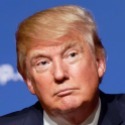Trump: Dump AT&T/TW & Comcast/NBC
Republican presidential candidate leads list of opponents to AT&T's proposed $85.4 billion takeover of Time Warner.

Although the ink is barely dry on AT&T's proposed purchase of Time Warner, opposition to the deal is already mounting, led by Donald Trump.
In a speech slamming the US mainstream media as "crooked," Trump vowed Saturday to block AT&T Inc. (NYSE: T)'s planned acquisition of Time Warner Inc. (NYSE: TWX) if elected president next month. Seeking to cast himself as a trustbuster in the mold of Teddy Roosevelt, the Republican presidential nominee declared that he would stop or break up corporate mega-mergers, especially in the media business.
Speaking at a campaign rally in Gettysburg, Pa., Trump termed the AT&T-Time Warner pact "a deal we will not approve in my administration because it's too much concentration of power in the hands of too few." The vow comes after the one-time reality show star has often criticized the news media, especially Time Warner's CNN, for allegedly biased reporting against him.
Along the same lines, Trump also pledged to somehow undo Comcast Corp. (Nasdaq: CMCSA, CMCSK)'s takeover of NBC Universal , even though that acquisition was approved by federal regulators and consummated several years ago. Claiming that "deals like this break democracy," he said his administration would "look at breaking that deal up and others like it" because it concentrates too much power in a single media entity.
"This should have never ever been approved in the first place," he said. "They're trying to poison the mind of the American viewer."
Trump's unprecedented threat to reverse Comcast's takeover of NBC Universal comes a year after the break-up of his long relationship with NBC, which carried his primetime show, The Apprentice, for years. It also comes after the Republican candidate has publicly griped about the skits that NBC's Saturday Night Live program has run on the presidential campaign mocking him.
But Trump is not the only political candidate taking issue with the latest proposed big media deal. Sen. Tim Kaine, the Democratic candidate for vice president, also expressed concerns about the AT&T-Time Warner pact Sunday morning while making the rounds of the TV news talk shows. He said lawmakers and regulators must review the deal to "get to the bottom" of questions about whether the merger would hurt competition in the media sector.
"I'm pro-competition," Kaine declared on NBC's Meet the Press program. "Less concentration, I think, is generally helpful, especially in the media."
Kaine added that he hasn't had a chance to review the details of the proposed deal. Later in the day, Democratic presidential candidate Hillary Clinton seconded Kaine's view, saying through a spokesperson that US regulators "should scrutinize it [the deal] closely."
In addition to the three candidates, several key US lawmakers expressed antitrust concerns about any union between AT&T and Time Warner over the weekend. The list includes: Sen Mike Lee, the Republican chair of the Senate subcommittee on antitrust; Amy Klobuchar, the ranking Democrat on the subcommittee; and Sen. Richard Blumenthal, a Democratic lawmaker from Connecticut.
In the media business, Walt Disney Co. (NYSE: DIS), a leading rival to Time Warner on the content side, has already taken the first swing at the deal. In a statement late Saturday, Disney Chief Communications Officer and Executive Vice President Zenia Mucha said "a transaction of this magnitude obviously deserves very close regulatory scrutiny."
The American Cable Association (ACA) , which represents small and independent cable operators, isn't too thrilled about the proposed corporate marriage either. "As the FCC has found in past mergers, combining valuable content with pay-TV distribution causes harm, to consumers and competition in the pay-TV market," ACA President Matthew Polka said in a statement. He argued that "the vertical integration of the merged company must be an issue that regulators closely examine."
Public interest groups railed against the deal as well, contending that it will lead to higher prices and other problems for consumers. "Just as AT&T's recent purchase of DirecTV was quickly followed by price hikes, there's every reason to expect this proposed tie-up would cost Internet users and TV viewers dearly too," said Free Press Policy Director Matt Wood.
So the battle is on. Stay tuned for more.
— Alan Breznick, Cable/Video Practice Leader, >Light Reading
About the Author(s)
You May Also Like












